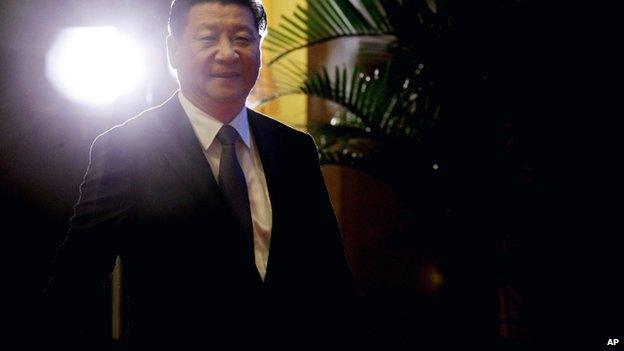China media: Brics bank
- Published

President Xi Jinping is representing China at the Brics summit in Brazil
Media analyse the possibility of a Chinese city hosting the headquarters of a proposed Brics development bank.
The Brics grouping - involving Brazil, Russia, India, China and South Africa - is likely to announce the opening of the bank at its annual summit in Brazil.
The bank could become a new challenger to the World Bank and the ranks of other similar regionally focused agencies, reports say.
Zhang Haibing, an expert in international economy with the Shanghai Institute for International Studies, tells the Beijing News, external that the new bank will bring "economic as well as strategic benefits for China", and supporting the bank "is a good opportunity to show that China is a responsible big nation".
Echoing similar sentiments, several media outlets are hoping that Shanghai or Hong Kong will be selected as the new bank's home.
Experts tell the Chinese Enterprise News , externalthat Beijing has a "bigger say in the Brics and the headquarters of the new bank is likely to be in Shanghai".
An article in the Shanghai Securities Times, external agrees that Shanghai has an advantage over other Brics cities because "it is an international financial centre".
The Qianjiang Evening News, external notes that Hong Kong is also a likely candidate to host the bank. "Hong Kong has a more open capital market, and has a better banking, judicial as well as financial regulatory system," it says.
However, Yukon Huang, senior associate in the Carnegie Asia Programme, points out that some Brics countries have concerns of being "over-reliant on China" and may prefer a Latin American city to host the bank.
He adds that Japan is the largest contributor to the Asian Development Bank, but its headquarters is based in the Philippines.
'No gifts' for teachers
Elsewhere, papers doubt Japanese PM Shinzo Abe's sincerity as he called for a summit with President Xi Jinping during the APEC (Asia Pacific Economic Co-operation) meeting later this year.
Mr Abe made the proposal on Monday amid escalating tensions between Beijing and Tokyo over territorial disputes.
Experts tell the China Daily, external that Mr Abe is using a "media ploy" to "give the impression of a diplomatic initiative".
Zhou Yongsheng, a professor of Japan studies at China Foreign Affairs University, says initiating media campaigns regarding such meetings is a "cunning strategy".
"Mr Abe feels that he has gained more bargaining chips with such a proposal. If the meeting is not held, he will blame China," he tells the daily.
Agreeing with the view, Liu Jiangyong, vice-dean of the Institute of Modern International Relations at Tsinghua University, believes that Mr Abe is "only faking the move to create an illusion of improving international relations".
The pundit also notes that Mr Abe's popularity in Japan is "slipping since his decision to end the country's ban on collective self-defence early this month".
"Mr Abe is only 'passing the ball' to China by showing fake willingness to improve relations to the international community, while he knows very well that China will not accept the request with unsolved problems," he tells the Global Times, external.
And finally, teachers have been banned from accepting monetary gifts from students or their parents in what is seen as another effort by the government to curb corruption.
The Ministry of Education released a statement on Monday prohibiting teachers from receiving gifts including securities and payment vouchers, reports say, external.
The ministry has also prohibited teachers from attending banquets arranged by students or their families.
BBC Monitoring, external reports and analyses news from TV, radio, web and print media around the world. For more reports from BBC Monitoring, click here. You can follow BBC Monitoring on Twitter, external and Facebook, external.